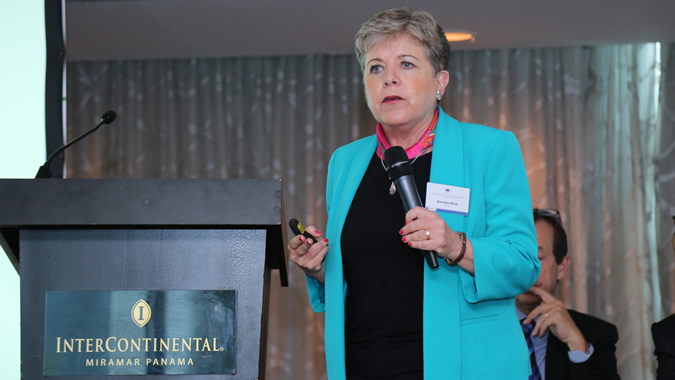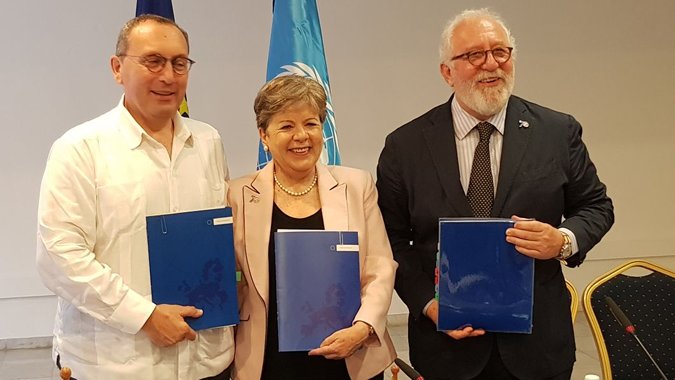Alicia Bárcena Calls for a New Narrative on International Cooperation for Latin American and Caribbean Development around the 2030 Agenda
Work area(s)
During a seminar organized by the European Union in Panama, ECLAC’s Executive Secretary emphasized the role of international cooperation in supporting countries in transition.

During a high-level meeting in Panama organized by the European Union, Alicia Bárcena, Executive Secretary of ECLAC, called for rethinking development and generating a new consensus based on greater regional integration, international cooperation that effectively supports the countries of Latin America and the Caribbean in their transition to development, and investments and industrial policies that favor the environmental push toward more sustainable growth for equality.
The United Nations regional commission senior authority was one of the main speakers at the European Union’s Regional Seminar for Latin America and the Caribbean, convened by the Directorate-General for International Cooperation and Development of the European Union (DG DEVCO). The seminar is being held in Panama City through this Friday, June 15.
Bárcena participated in the panel “Opportunities for cooperation with Latin America and the Caribbean in the context of the EU Consensus,” along with Stefano Manservisi, Director-General of DG DEVCO; Jorge Familiar Calderón, Vice President of the World Bank; and Mario Pezzini, Director of the Organization for Economic Cooperation and Development’s (OECD) Development Centre.
In her remarks to the audience composed of EU ambassadors to the region, high-level officials of diverse EU institutions, and representatives of numerous regional and international organizations, of both civil society and the private sector, the Executive Secretary of the Economic Commission for Latin America and the Caribbean (ECLAC) pointed out that, in light of the deep tectonic shifts currently defining globalization – the technological revolution, the future of work in view of robotics, climate change, geopolitical changes, the crisis of mega-agreements, migration and the aging population – it is urgent that we seek new patterns of production and consumption.
“In this scenario, the United Nations 2030 Agenda and its 17 Sustainable Development Goals (SDGs) represent a paradigm shift; it is a civilizing agenda that requires better international and regional governance,” underscored Bárcena.
In this uncertain international context, international cooperation plays a key role, particularly for nations in transition or “middle-income” countries, asserted the international official. Currently, 85% of the countries in the region are included in this category which classifies them according to per capita gross national product (GNP), without considering the deep structural gaps that many of them present.
“These countries have ‘graduated’, so to speak, and are no longer eligible to receive official development aid (ODA), but this does not guarantee their access to other sources of financing and eliminates trade preferences,” explained Bárcena. “In the case of small island developing states (SIDS), especially in the Caribbean, the size and isolation of their economies are a significant restriction to the mobilization of national resources, in addition to their vulnerability to the effects of climate change and debt accumulation,” she underlined.
Alicia Bárcena reiterated that although Latin America and the Caribbean have managed to significantly reduce inequalities in recent years, it continues to be the most unequal region in the world. She pointed out that this reduction of inequalities has led to a transformation in the structure of societies, pulling a large number of households out of poverty. Figures show that the middle classes are increasing at a greater rate than the average for OECD countries. Nevertheless, these middle classes have been left more vulnerable to the setbacks of development, which could return them to a situation of poverty, she said.
“As we indicated in our last institutional document, inequality is inefficient in that it generates a vicious circle of low productivity and social exclusion,” she stated. “For this reason, we advocate for a new style of development that ends the culture of privilege and is based on sustainable transformation and a big environmental push, on productive inclusion with more technology, better institutions that inspire confidence in citizens and, above all, greater equality and universal access to welfare,” specified Bárcena.
On the role of international cooperation, ECLAC’s Executive Secretary reaffirmed that South-South and triangular cooperation provide for the protection of the interests of middle-income nations, to bolster the participation of developing nations in global forums on fiscal cooperation, and to address the damaging fiscal competition among countries through integrated regional programs. “Therefore, it is increasingly necessary that we strengthen less asymmetrical forms of cooperation,” she emphasized.
Bárcena indicated that the recent regional Agreement to Facilitate the Development of Countries in Transition, signed by the EU, ECLAC and the OECD, is a tool that opens an unprecedented space for rethinking a new type of development and advancing toward renewed cooperation that must be based on six pillars: stronger regional dialogue; greater emphasis on cooperation on fiscal policies that allow for the mobilization of resources, both domestic and international; investment in industrial and technological policies that favor a big environmental push; improved statistical capacities for better measurement; focus on gender equality; the opening of spaces for dialogue among governments, businesses and citizens, as well as better coordination with the United Nations system, regional entities and development banks.
Related content

European Union, OECD and ECLAC Sign Agreement to Facilitate the Development of Countries in Transition
The instrument was signed today in the framework of ECLAC’s thirty-seventh session, which is taking place through Friday, May 11 in Havana, Cuba.
Country(ies)
- Latin America and the Caribbean
- European Union
Contact
Public Information Unit
- prensa@cepal.org
- (56 2) 2210 2040